Free AI Voice Clone: 12 Best Tools to Clone Your Voice (2026)

Voice cloning technology has revolutionized content creation, allowing anyone to generate studio-quality voiceovers without expensive equipment or professional actors. This guide provides actionable insights into the 12 best tools offering a free AI voice clone, helping you choose the right platform for your specific projects. If you're just getting started, understanding the core concepts is key; you can find a comprehensive overview in a simple guide to Voice Cloning AI.
We'll explore each option's unique strengths and limitations, from instant cloning for social media clips to high-fidelity models for audiobooks. Each review includes screenshots and direct links to get you started immediately. While many services offer compelling free tiers, platforms like Verbatik stand out by providing not only high-quality voice cloning but also unlimited text-to-speech and voice cloning. This feature gives you an actionable advantage: unparalleled creative freedom without ever worrying about character limits or paying for extra usage.
Our goal is to cut through the noise and give you a clear, honest assessment of what each tool can realistically achieve. Whether you need AI text to speech for professional voiceovers, a celebrity voice generator for creative projects, or free text to speech to get started immediately, this guide has you covered.
1. Verbatik AI: The All-in-One Creative Powerhouse with Unlimited TTS
Verbatik AI establishes itself as a premier choice for creators seeking a robust free AI voice clone solution combined with an extensive production toolkit. It distinguishes itself by removing the creative bottlenecks found on other platforms. Its core advantage is offering unlimited text-to-speech and voice cloning, a game-changing feature for professionals producing long-form content like audiobooks, comprehensive e-learning courses, or serialized podcasts without worrying about character counts. This unlimited model provides unmatched value and creative freedom.
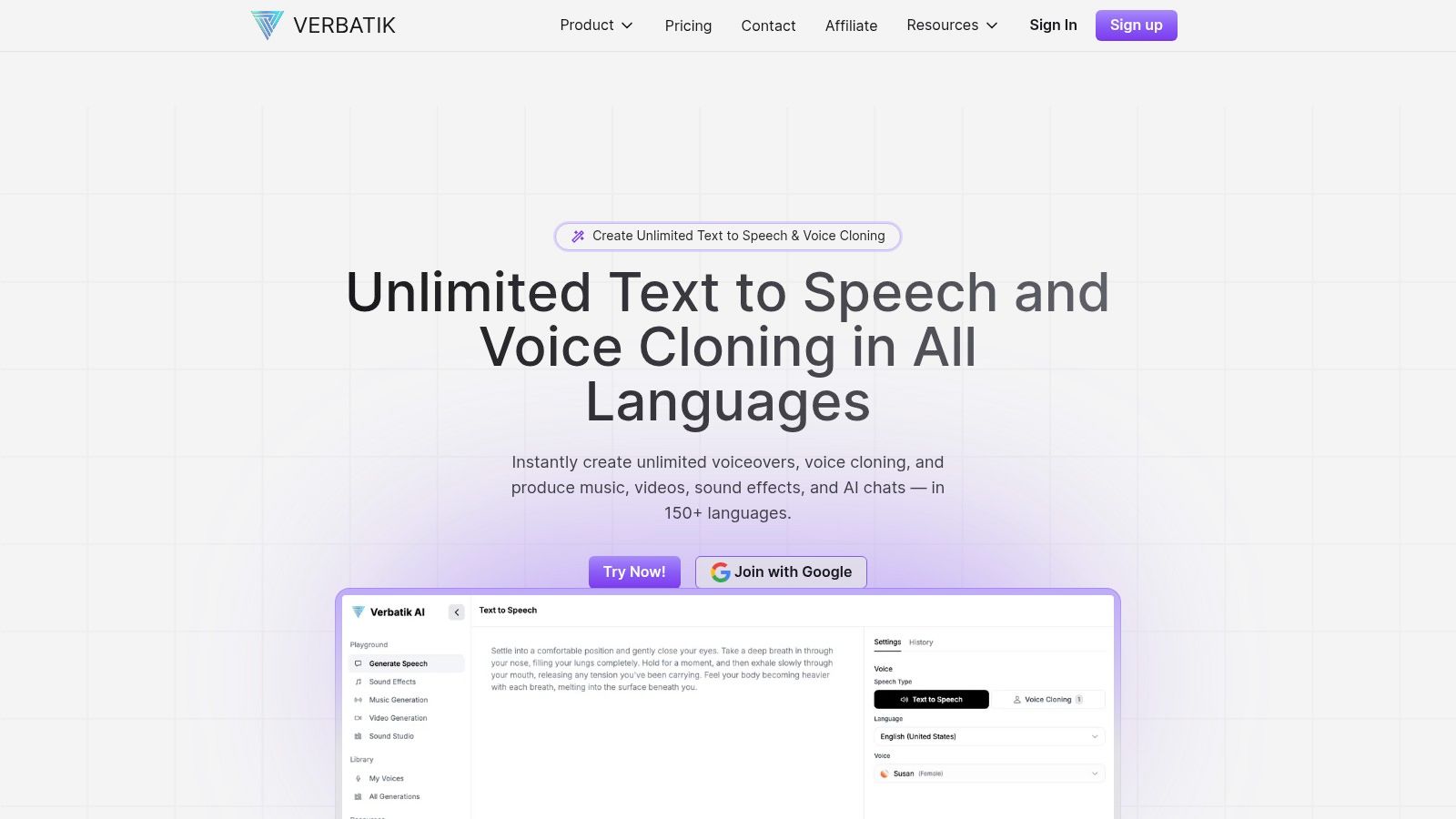
The platform’s instant voice cloning technology captures impressive emotional nuance, creating high-fidelity replicas from just a short audio sample. This allows for dynamic and engaging narration that sounds natural, not robotic. Verbatik consolidates the entire content creation workflow by integrating a full suite of AI tools. Beyond voice, users can access royalty-free music, sound effects, and even generate AI avatar videos, all within a single, intuitive dashboard. This all-in-one approach streamlines production, saving significant time and resources. For a deeper understanding of the technology, you can explore their detailed guide on the advancements in voice cloning technology.
Key Features and Analysis
- Unlimited Text-to-Speech and Voice Cloning: This is Verbatik's standout offering. It completely eliminates character limits, making it the ideal choice for high-volume audio projects where cost and restrictions would otherwise be prohibitive.
- Integrated Creative Suite: The platform includes AI-generated music, sound effects, and video avatars. This transforms it from a simple voice tool into a comprehensive content production studio.
- Extensive Voice Library: With over 600 realistic voices across more than 142 languages and accents, it provides unparalleled flexibility for global projects and diverse character creation.
- Ethical Cloning Focus: Verbatik emphasizes consent-based cloning, requiring explicit permission and ensuring responsible use of its powerful technology.
- Developer API: A well-documented and affordable API allows for seamless integration into applications, workflows, and large-scale content systems.
Website: https://verbatik.com
2. ElevenLabs
ElevenLabs is a leading platform in the voice synthesis space, renowned for its incredibly realistic and emotionally nuanced text-to-speech (TTS) output. While it offers a powerful free AI voice clone tool, its true strength lies in the quality of its "Professional Voice Cloning" and the extensive API for developers. The free tier is an excellent entry point for testing the technology's capabilities, providing users with 10,000 characters per month (roughly 10 minutes of audio). For creators needing more capacity, this limit contrasts with platforms like Verbatik, which offers unlimited text-to-speech and voice cloning for uninterrupted production.
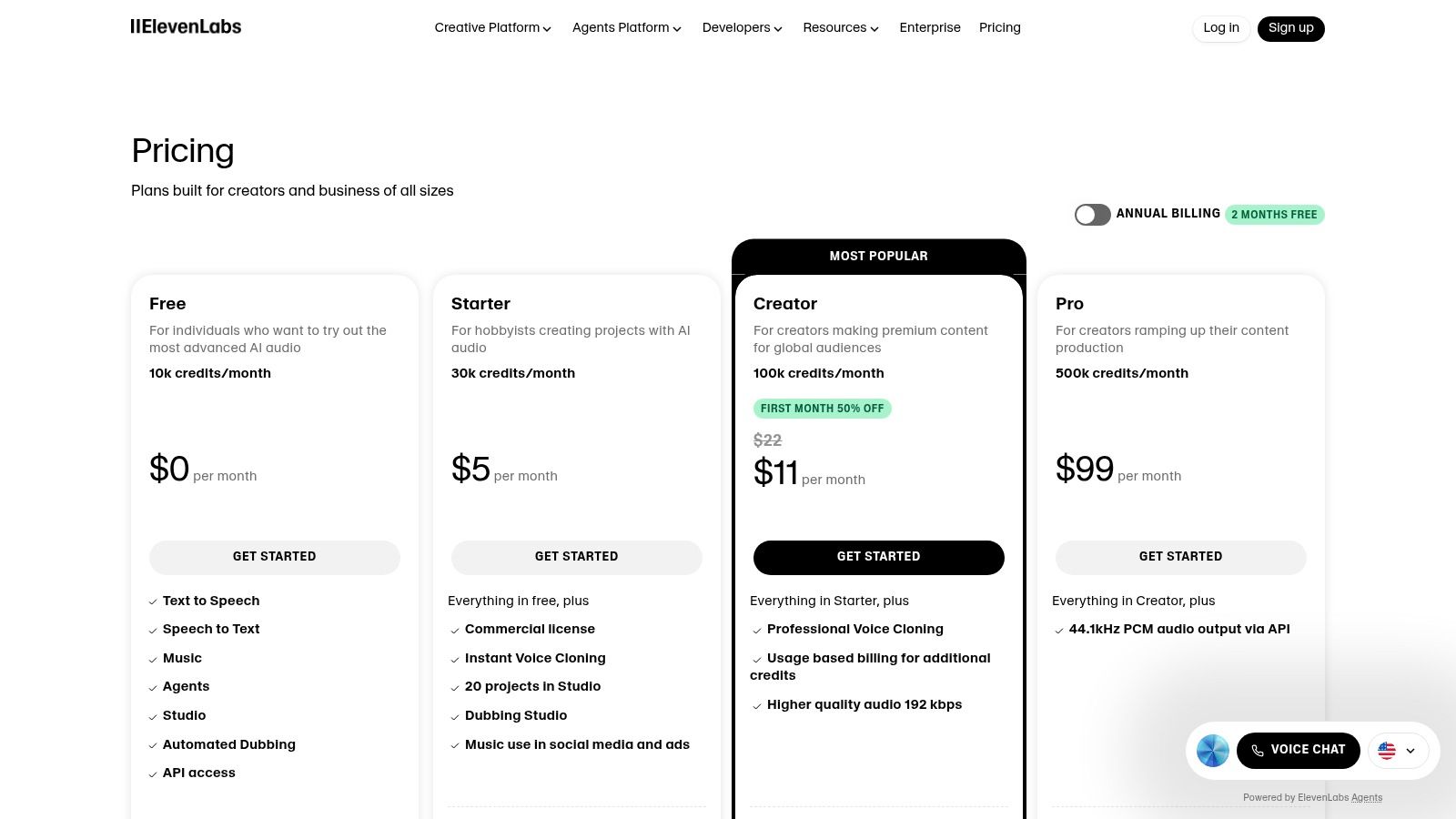
Key Features and Limitations
The platform's standout feature is its "Instant Voice Cloning," which requires only a minute of clean audio to create a usable clone. However, access to this and the more advanced Professional Voice Cloning is reserved for paid tiers. The actionable insight here is to use the free plan to generate high-quality voiceovers for short projects like social media clips or YouTube intros, and then evaluate if the paid tiers' cloning features are necessary for your workflow.
Pros:
- Unmatched Realism: Voices generated by ElevenLabs are widely considered among the most lifelike and expressive available.
- Robust API: Ideal for developers looking to integrate high-quality TTS into applications, games, or other software.
- Active Development: The platform is constantly updated with new features and improvements.
Cons:
- Limited Free Tier: The 10,000-character monthly limit is restrictive for anything beyond short tests.
- Cloning is Gated: True voice cloning requires a paid subscription, starting from the "Creator" tier.
Website: https://verbatik.com/pricing
3. PlayHT
PlayHT is a powerful cloud-based text-to-speech platform that offers both instant and professional-grade voice cloning. While many of its advanced features are behind a paywall, it stands out with a generous startup program that provides free credits, making it an excellent option for developers and small teams looking to explore a high-quality free AI voice clone solution. The platform emphasizes speed and realism, positioning itself as a strong contender for projects requiring quick turnaround and natural-sounding audio.
Key Features and Limitations
PlayHT's key strength is its developer-centric approach, featuring real-time streaming APIs that are perfect for interactive applications. Its instant cloning requires just a few minutes of audio to generate a usable voice model. The actionable insight is to leverage its startup program credits for a substantial free trial. This makes it a practical choice for teams needing to prototype integrations or create initial voice assets before committing to a subscription, a different approach compared to platforms like Verbatik, which offer unlimited text-to-speech and voice cloning from the start.
Pros:
- Developer-Friendly: Strong API and clear documentation make it easy to integrate into various applications.
- Fast Processing: Instant voice cloning delivers quick results for rapid prototyping and content creation.
- Multilingual Support: Offers a broad catalog of languages and accents, suitable for global projects.
Cons:
- Gated Advanced Features: High-fidelity cloning and premium features are typically locked behind paid tiers.
- Less Transparent Pricing: The credit-based system and various plans can be confusing for new users to navigate.
Website: https://app.verbatik.com/app/sign-up
4. Resemble AI
Resemble AI is a flexible and developer-friendly platform offering a robust suite of voice AI tools, including a powerful free AI voice clone option through its onboarding trial. It stands out with a clear pay-as-you-go credit system, making it accessible for pilot projects while being scalable for enterprise needs. The actionable insight here is that you can create custom voices with as little as three minutes of audio, providing a low-friction entry point for high-quality voice generation.
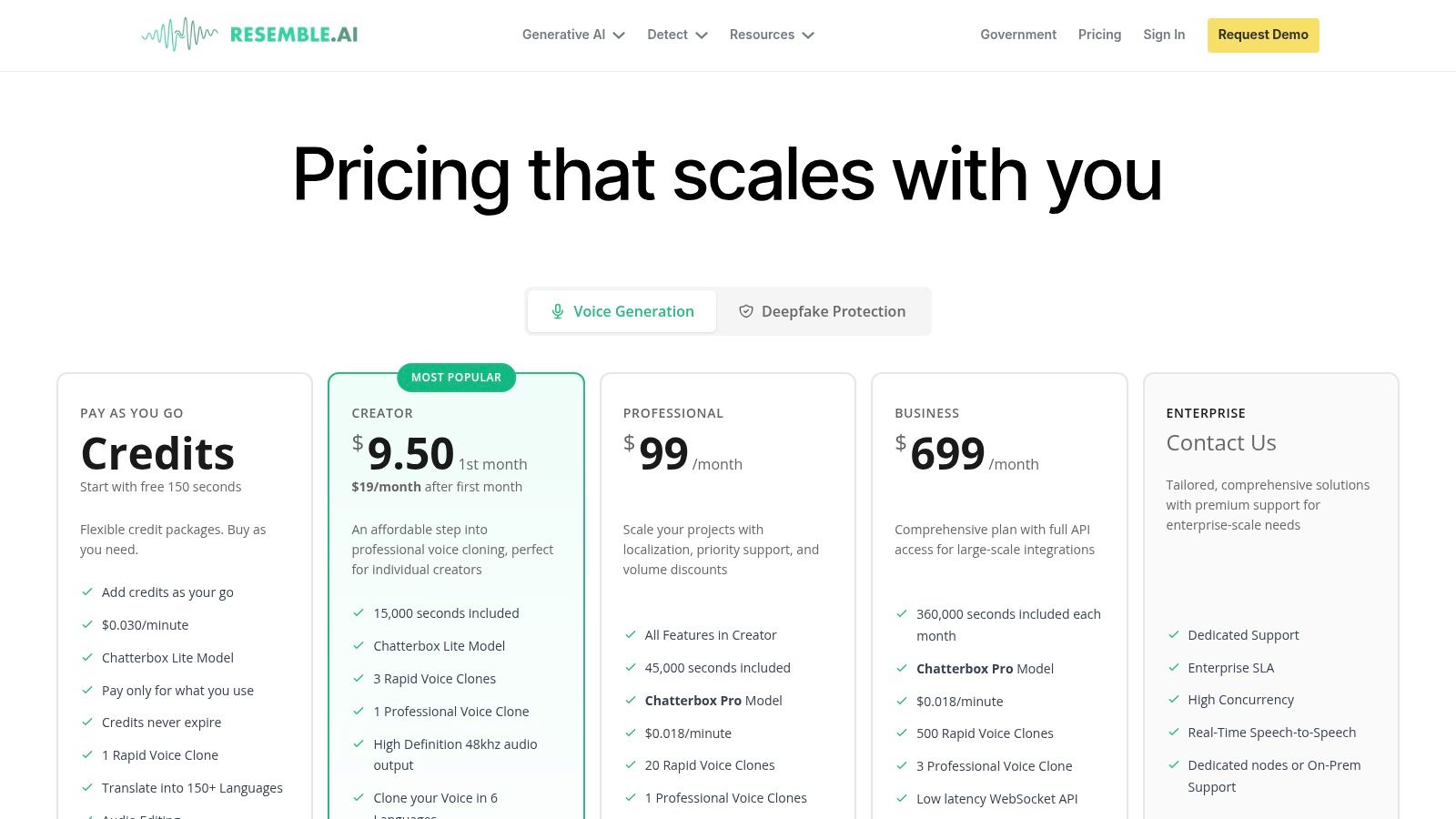
Key Features and Limitations
The platform's strength lies in its comprehensive toolset, which includes not just voice cloning but also real-time speech-to-speech conversion and localization into over 150 languages. The free trial gives users access to create one voice clone and experiment with the API. While this is great for testing, ongoing projects require purchasing credits, which contrasts with platforms like Verbatik that offer unlimited text-to-speech and voice cloning on their paid plans. The highest fidelity clones are also reserved for higher-tier professional services.
Pros:
- Clear Pay-As-You-Go Pricing: Low entry cost and transparent credit system make it easy to manage budgets.
- Strong Localization Support: Ideal for projects requiring voiceovers in multiple languages.
- Developer-Friendly API: Extensive documentation and tools for seamless integration into applications.
Cons:
- Credit Management Required: Users must actively monitor their credit usage for budgeting.
- Best Quality is Gated: The highest fidelity clones require custom enterprise-level engagement.
Website: https://www.resemble.ai/pricing/
5. Kits.AI
Kits.AI is a unique platform in the voice synthesis market, carving out a niche specifically for musicians, singers, and producers. While many tools focus on spoken word, Kits.AI excels at music-centric applications, offering voice conversion and cloning tailored for vocal tracks. Its approach to providing a free AI voice clone experience is through conversion minutes. The actionable insight is to use the free tier to test its core functionality for musical projects before committing to a paid plan. This makes it an ideal starting point for artists wanting to experiment with AI in their music.
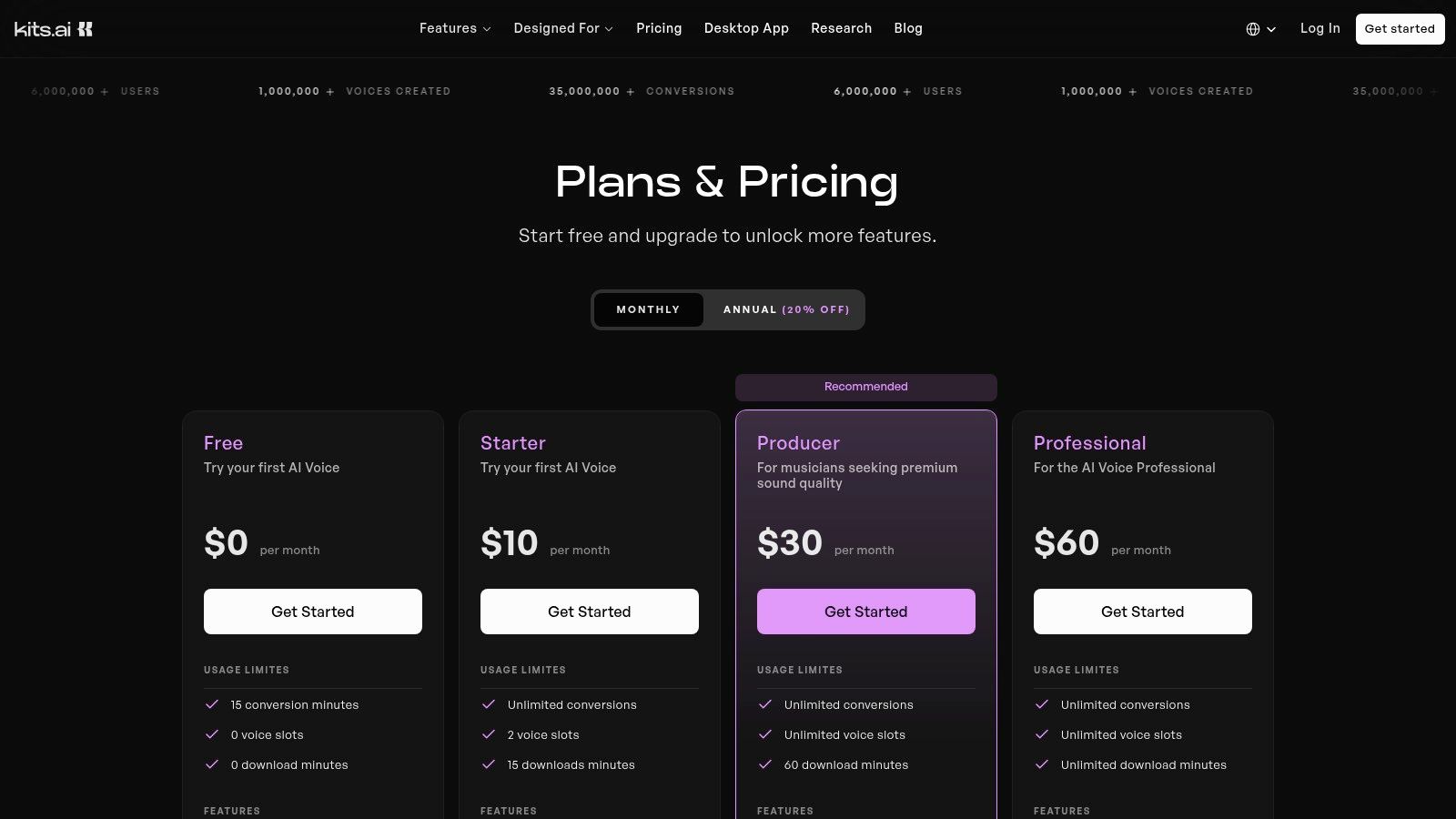
Key Features and Limitations
The platform's standout features are its AI Voice Converter and Voice Blender, which allow users to transform their vocal recordings using a library of artist voices. The free plan provides limited conversion minutes to explore these tools. However, true "Instant" or "Professional" voice cloning is a premium feature, requiring a paid subscription. The free tier is best used for experimentation, as it excludes cloning and the ability to download your generated audio files. For spoken word projects requiring high volume, consider alternatives like Verbatik, known for unlimited text-to-speech and voice cloning.
Pros:
- Music-Centric Tools: Specialized features like stem splitters and vocal converters are perfect for music production.
- Entry-Level Free Tier: The free plan offers a good way to test the platform's unique conversion capabilities.
- Scalable Plans: Options are available for everyone from hobbyists to professional studio artists.
Cons:
- Cloning is Gated: Creating a custom voice model is exclusive to paid subscription tiers.
- Free Tier Restrictions: The inability to download audio and the lack of cloning features limit its practical use for free users.
Website: https://app.verbatik.com/app/sign-up
6. Uberduck
Uberduck has carved out a niche as a creator-friendly platform, popular for everything from rap and singing to experimental voice projects. It offers a very accessible free AI voice clone process that gets users started in seconds. The actionable insight is to use Uberduck as a go-to for content creators wanting to test the waters without commitment. While its free tier is a great entry point, its affordable paid plans unlock commercial usage and API access for more serious projects.
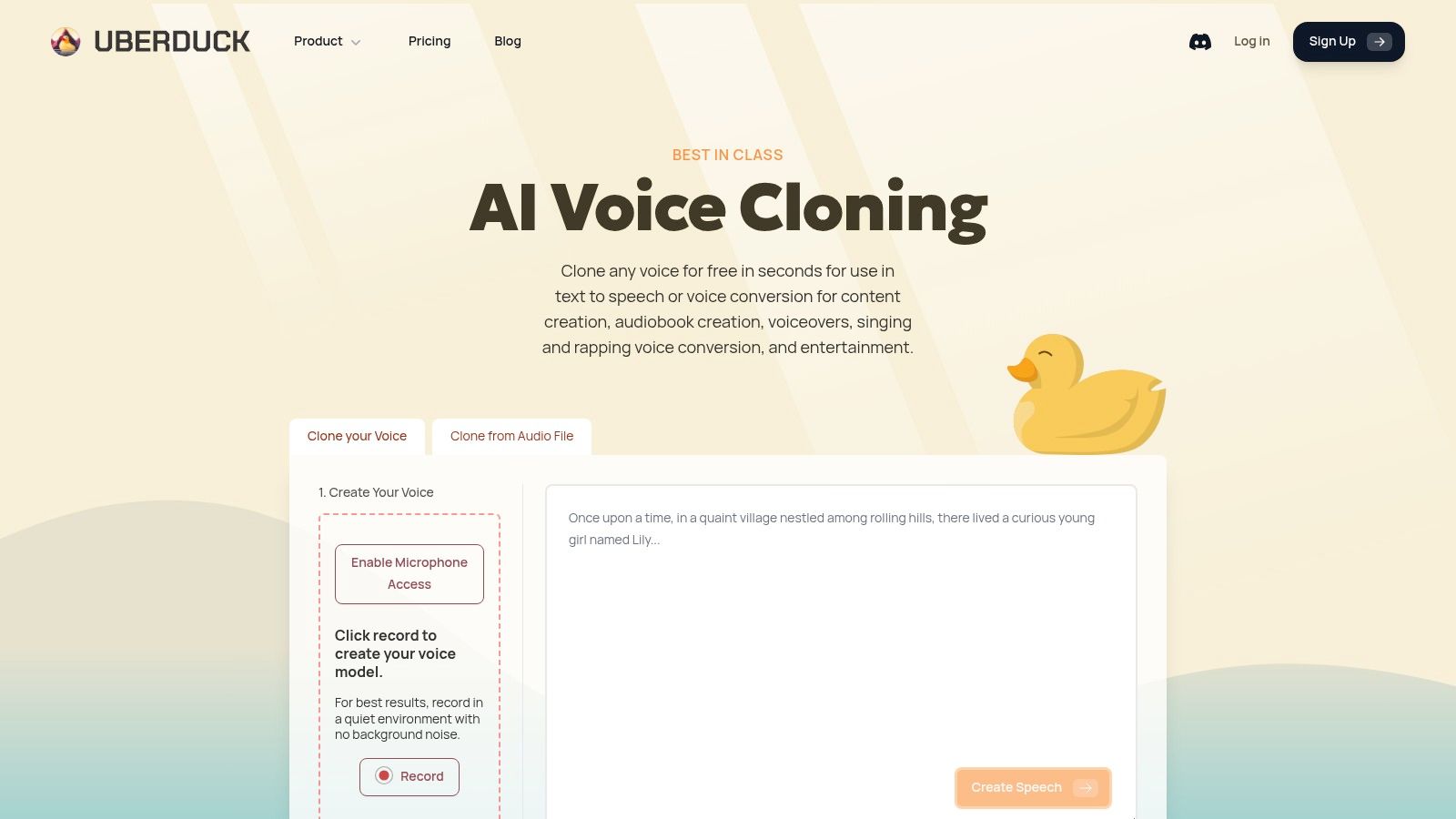
Key Features and Limitations
The platform's standout feature is its straightforward voice cloning onboarding, combining text-to-speech and voice conversion for creative workflows. However, the free usage is quite limited, and most advanced features, like API access and commercial rights, are behind a paywall. For those seeking more extensive generation capabilities without such restrictions, platforms like Verbatik offer unlimited text-to-speech and voice cloning, providing a different value proposition for high-volume users. Learn more about the evolving landscape of AI voice generation tools to compare your options.
Pros:
- Low Barrier to Entry: The free cloning process is exceptionally fast and easy to use.
- Affordable Paid Plans: Unlocking commercial rights and more features is very budget-friendly.
- Active Creator Community: Great for users focused on creative and musical applications.
Cons:
- Limited Free Usage: The free tier is best suited for small tests rather than full projects.
- Variable Fidelity: Voice quality can vary depending on the chosen model and the quality of your source audio.
Website: https://app.verbatik.com/app/sign-up
7. Descript Overdub
Descript is a powerful, all-in-one audio and video editor that treats media like a text document. Its integrated AI voice cloning feature, "Overdub," is designed for correcting mistakes or adding new words to your own recordings. The actionable insight is to use Descript’s free plan to experiment with its text-based editing workflow, making it a unique tool for podcasters and video creators who need a free AI voice clone for minor edits and corrections.
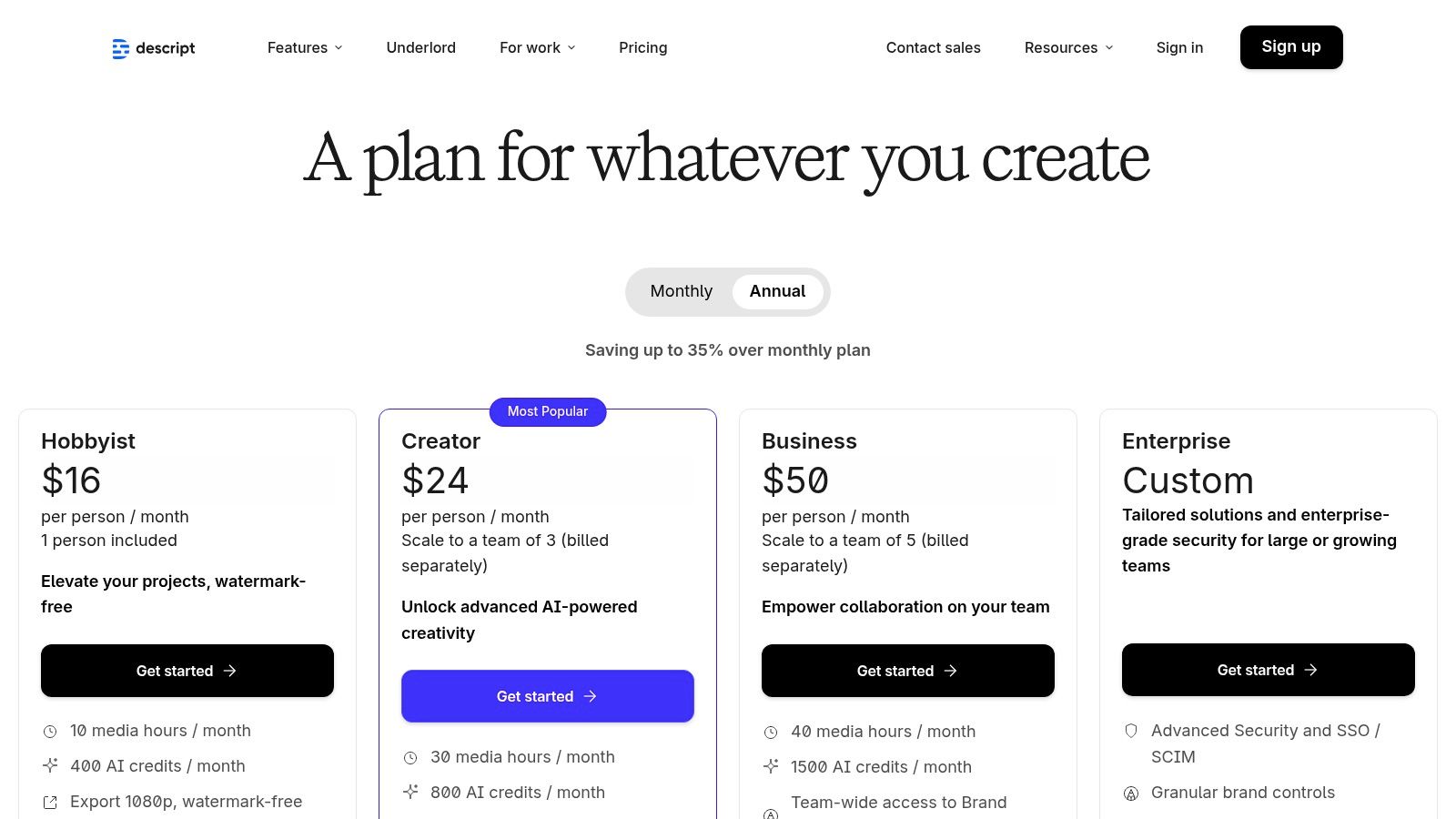
Key Features and Limitations
Descript’s Overdub feature stands out by focusing on cloning your own voice with a clear and responsible consent workflow. The free tier allows you to generate a limited vocabulary of up to 1,000 words, perfect for quick fixes. For unlimited vocabulary and more extensive cloning, a paid plan is required. The platform's true value lies in its seamless integration of transcription, editing, and voice generation, creating an efficient post-production environment. For generating full scripts or long-form content, platforms with unlimited text-to-speech and voice cloning, like Verbatik, are a better fit.
Pros:
- One-stop Solution: Combines an editor, transcriber, and voice cloner in a single application.
- Ethical Workflow: A strong emphasis on user consent is built directly into the voice cloning process.
- Powerful Transcription: The text-based editing fueled by its accurate transcription is highly intuitive.
Cons:
- Cloning is Limited: The free plan's 1,000-word vocabulary cap restricts its use to minor corrections.
- Occasional Bugs: Some users report occasional bugginess or UX friction within the complex software.
Website: https://www.descript.com/price
8. Voice.ai
Voice.ai carves out a unique niche by focusing on real-time voice changing through a desktop application, making it popular among gamers and streamers. Instead of a purely web-based interface, it offers a downloadable client that processes audio directly on your machine. The actionable insight is to download the free client to get a free AI voice clone experience for live applications. Its more advanced features and business offerings are geared towards developers needing scalable TTS solutions and real-time agent voice conversion.
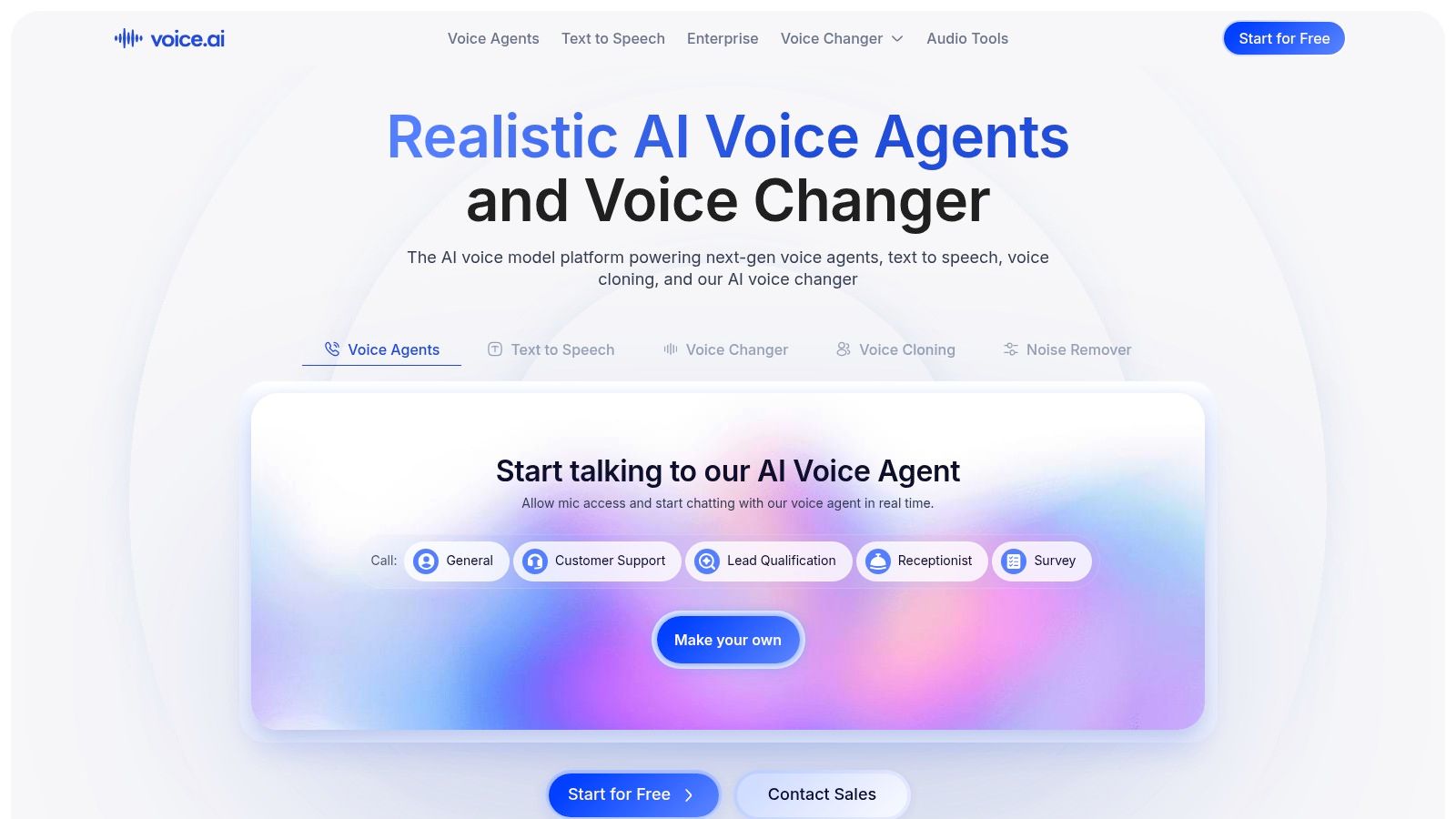
Key Features and Limitations
The platform's primary strength is its client-side, real-time voice conversion, which is a major differentiator from browser-based tools. It also offers APIs and SDKs for developers looking to build custom integrations. The free version gives you a taste of the technology, but users should be aware of reports concerning billing practices and variable performance. Its approach contrasts with services like Verbatik, which offer unlimited text-to-speech and voice cloning directly through a more predictable web interface. For more details on the platform's capabilities, explore the innovations behind Voice.ai's text-to-speech.
Pros:
- Real-Time Processing: Ideal for live applications like gaming, streaming, or virtual meetings where instant voice modulation is needed.
- Developer APIs: Provides robust tools for integrating voice technology into custom software and enterprise-level applications.
- Free Desktop App: Allows users to test the basic voice-changing features without an initial subscription.
Cons:
- User Complaints: Some users have reported issues with billing and customer support, warranting caution.
- Performance Varies: As a desktop client, its performance can depend heavily on your computer's hardware resources.
Website: https://app.verbatik.com/app/sign-up/
9. MyShell OpenVoice
MyShell OpenVoice is a powerful, fully open-source instant voice cloning model, making it a unique and compelling free AI voice clone option for developers and technically-inclined users. Developed by MIT and MyShell, it is released under the permissive MIT License, meaning it is completely free for both personal and commercial use without restrictions. The actionable insight is to use this tool if you need total control over data privacy and integration through self-hosting, as it offers a level of freedom commercial platforms cannot match.
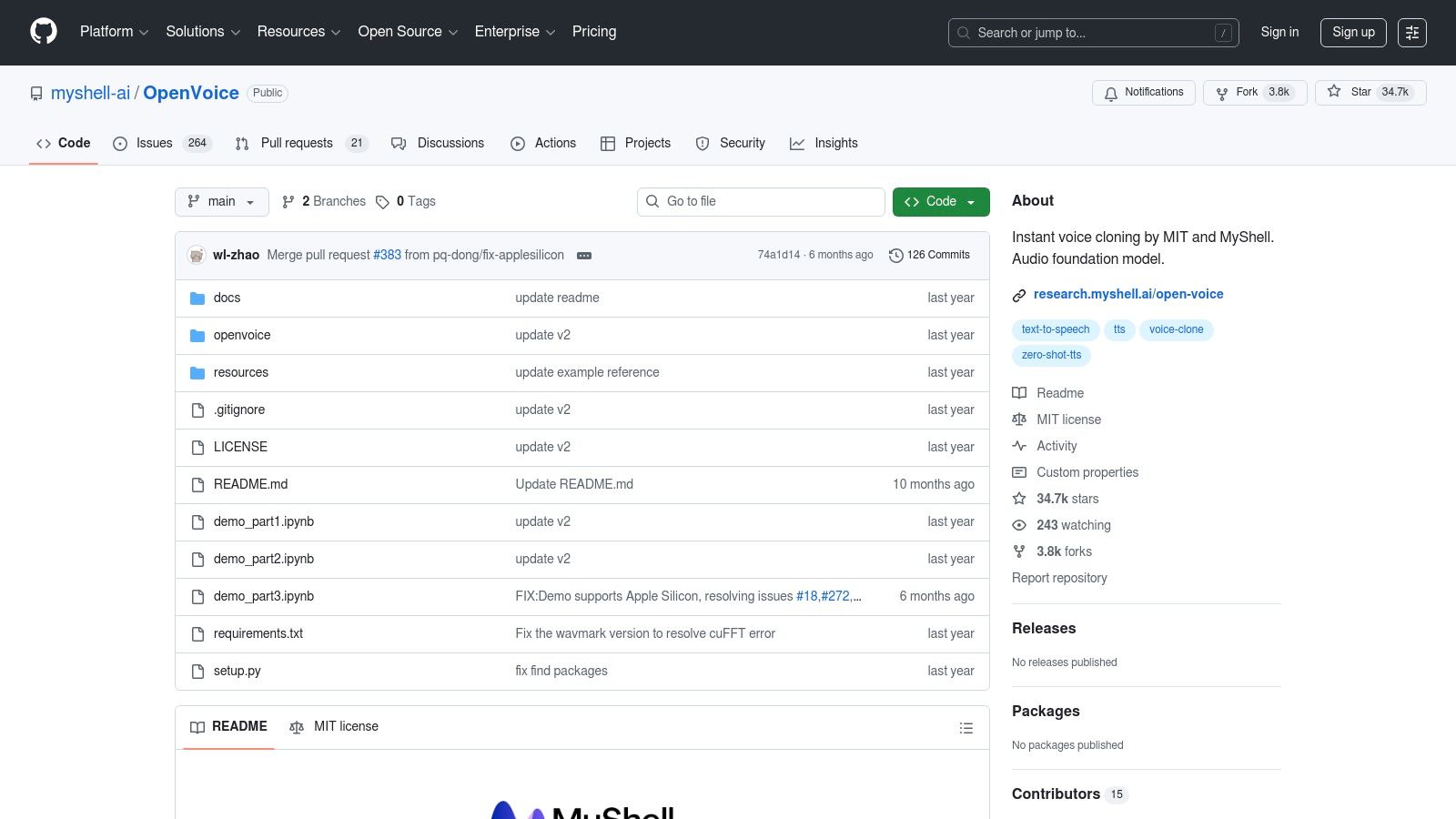
Key Features and Limitations
The platform excels at instant tone-color cloning from just a short audio sample and supports granular style controls, allowing users to tweak emotion, rhythm, and accents. A key differentiator is its zero-shot cross-lingual cloning capability, enabling a voice to speak in multiple languages. Unlike turnkey platforms, OpenVoice requires users to have the technical expertise and infrastructure to set it up. It is a tool for building, not just using, and a stark contrast to easy-to-use services like Verbatik, which provide unlimited text-to-speech and voice cloning through a simple interface.
Pros:
- 100% Free and Open-Source: No fees or licensing costs for commercial use, offering unparalleled value.
- Complete Privacy Control: Self-hosting ensures your data and voice clones remain on your own servers.
- Highly Customizable: No vendor lock-in allows for deep integration into custom applications and workflows.
Cons:
- Requires Technical Expertise: Setup and use demand machine learning knowledge and infrastructure management.
- No User Interface: Lacks a ready-to-use GUI, relying on command-line operations and community support.
Website: https://github.com/myshell-ai/OpenVoice
10. Retrieval-based Voice Conversion (RVC) Project
For users seeking a completely free AI voice clone solution with maximum control, the Retrieval-based Voice Conversion (RVC) Project is an unparalleled open-source toolkit. Unlike cloud-based platforms, RVC runs locally on your machine, offering total privacy and zero costs. The actionable insight is to adopt this tool if you are a technically-inclined user who wants to train your own high-quality voice models for real-time conversion or batch processing without the limitations found in many commercial tools.
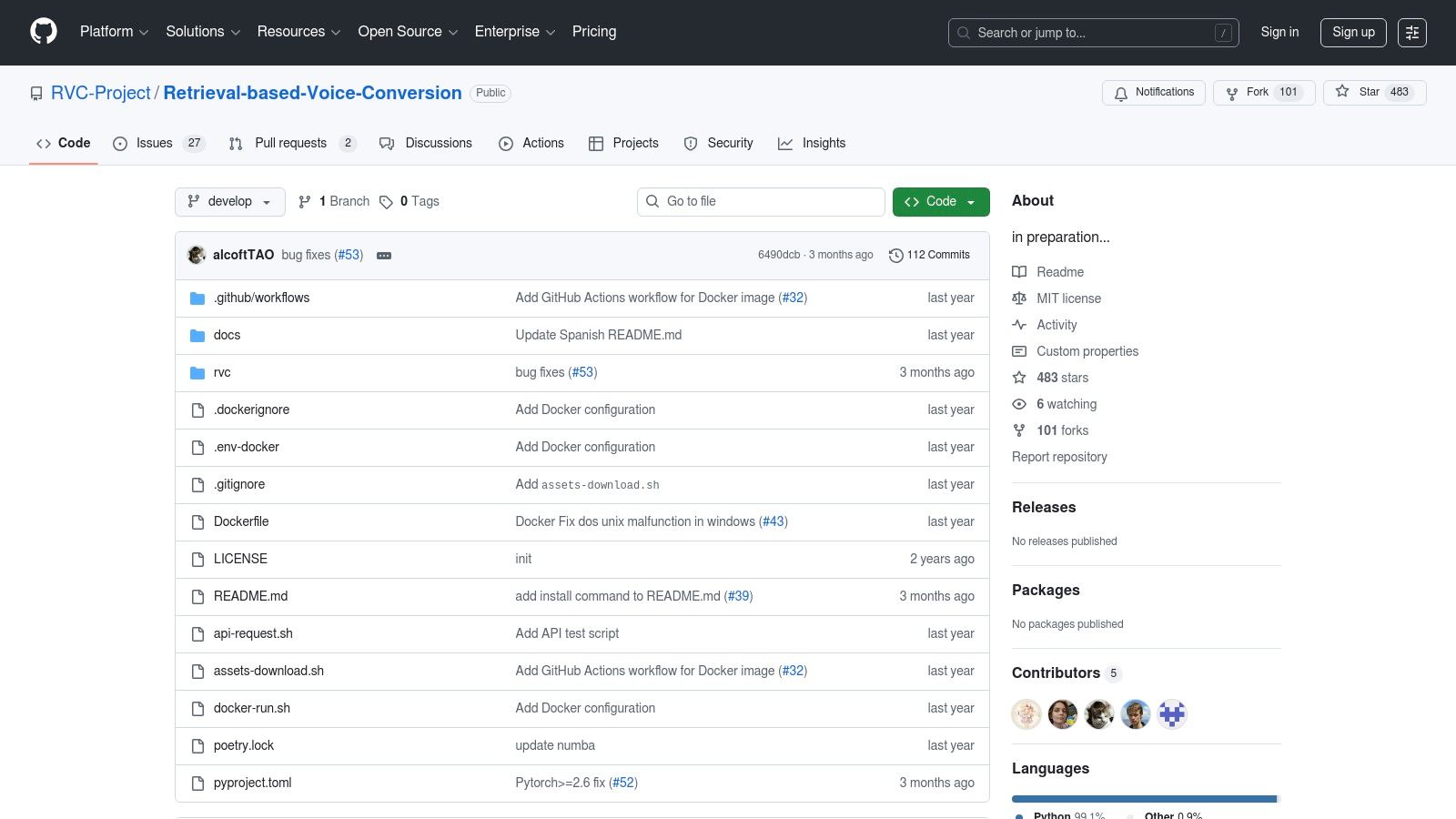
Key Features and Limitations
The project's core strength is its VITS-based architecture combined with retrieval mechanisms, allowing for high-fidelity voice conversion. Users can either train a custom model with their own audio data or use pre-trained models shared by the community. While there is no official interface, numerous community-developed GUIs and Google Colab notebooks make it accessible. It represents a different approach from streamlined services like Verbatik, which offer unlimited text-to-speech and voice cloning without any technical setup. You can learn more about the evolution of these voice cloning models and their underlying technology.
Pros:
- Completely Free & Private: No subscriptions or data-sharing, as all processing happens on your local hardware.
- Extensive Community Support: A large user base provides tutorials, pre-trained models, and troubleshooting help.
- High Degree of Control: Users have full control over the training process and model parameters for custom results.
Cons:
- Requires Technical Skill: The setup, training, and usage demand a certain level of technical expertise.
- GPU Dependent: Achieving real-time performance and reasonable training times requires a powerful GPU.
- Ethical Responsibility: Users are solely responsible for sourcing ethically-consented audio data for training.
Website: https://github.com/RVC-Project/Retrieval-based-Voice-Conversion
11. w-okada/voice-changer
For users seeking a powerful, completely free, and open-source solution, w-okada's voice-changer stands out as a top-tier client. This is not a cloud-based service but a local application for Windows, Mac, and Linux that specializes in real-time voice conversion using RVC models. The actionable insight is to use this free AI voice clone tool for live applications like streaming or online gaming, where you need to modify your voice on the fly without latency issues or per-minute costs.
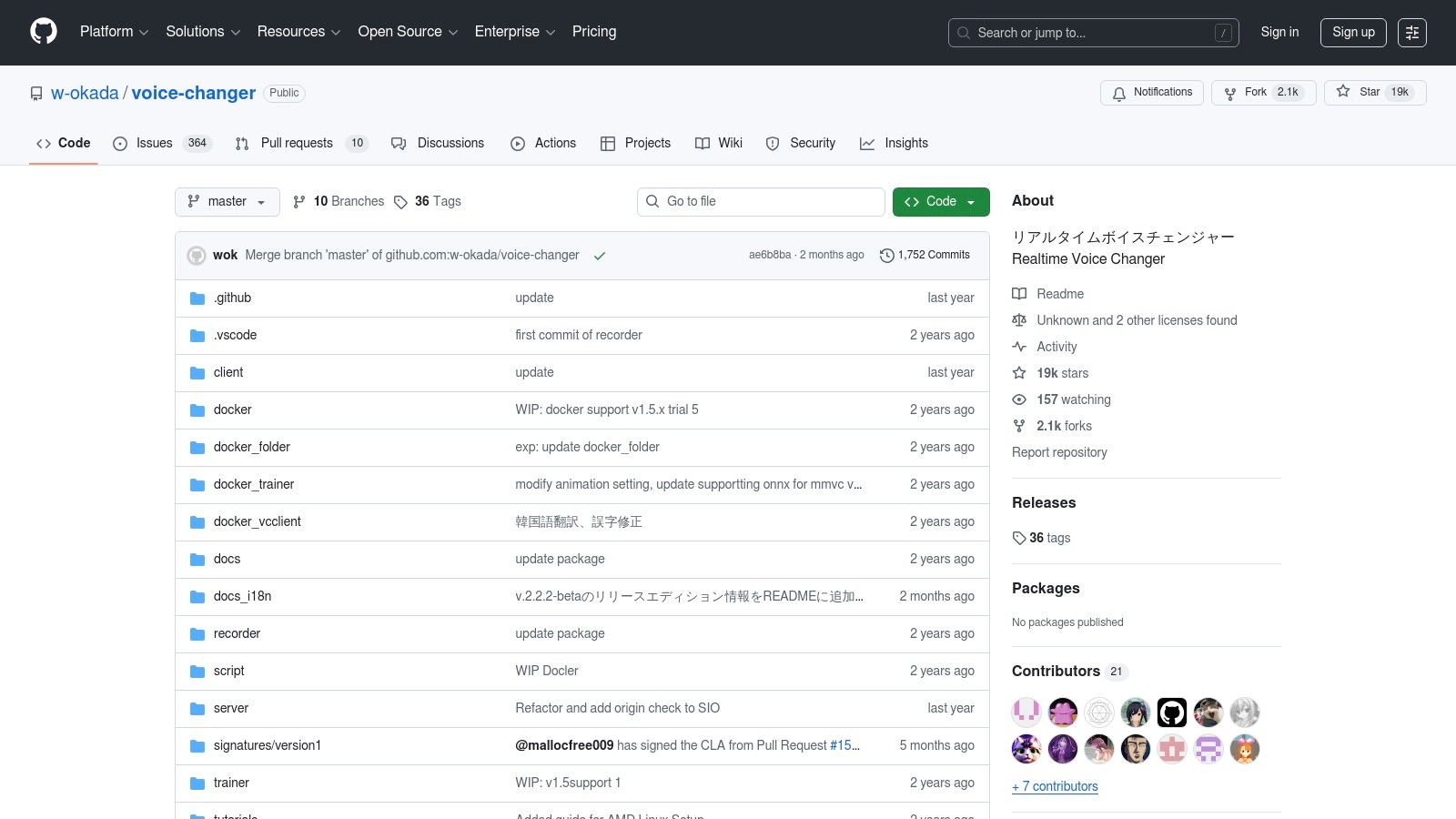
Key Features and Limitations
The platform’s core strength is its real-time microphone-to-target voice conversion, which runs entirely on your local machine. This offline processing ensures privacy and eliminates reliance on internet connectivity. Because it's open-source, it benefits from an active community that contributes frequent updates and improvements. While this provides incredible flexibility, it also means support is community-driven rather than guaranteed by a vendor. This is a key difference from platforms like Verbatik, which provide both a product and support for their unlimited text-to-speech and voice cloning services.
Pros:
- Completely Free: No subscriptions, character limits, or per-minute costs for processing.
- Real-Time Performance: Optimized for low-latency voice changing on consumer-level GPUs, perfect for live applications.
- Actively Maintained: The project is continuously updated and improved by its developer and the community.
Cons:
- Community-Only Support: No official customer service or service-level agreements (SLAs).
- Requires Tuning: Users may need to adjust settings to get the best balance between quality and latency.
Website: https://github.com/w-okada/voice-changer
12. Tortoise-TTS
For those with technical expertise and a powerful computer, Tortoise-TTS offers a completely free AI voice clone solution that operates offline. As an open-source project, it provides unparalleled control and privacy. Its strength lies in producing high-fidelity, natural-sounding speech for long-form content. The actionable insight is to choose Tortoise-TTS for projects like audiobooks or podcasts, where real-time generation is not a priority and audio quality is paramount.
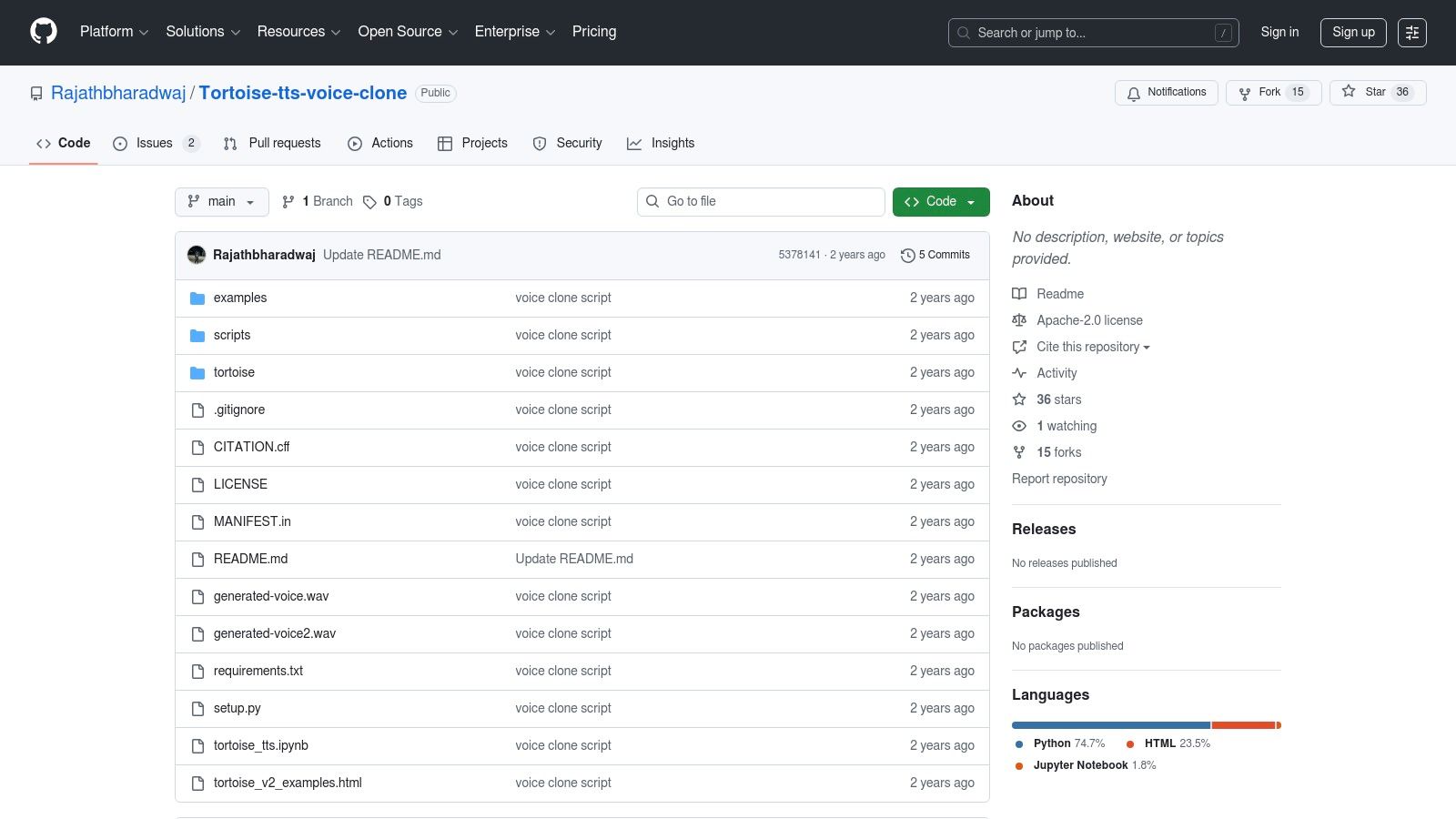
Key Features and Limitations
Tortoise-TTS uses a reference-audio-guided approach, requiring just a few high-quality audio clips of the target voice to create a clone. Since it runs locally on your machine (requiring a capable GPU), there are no character limits or subscriptions, a key differentiator from cloud services like Verbatik, which offers unlimited text-to-speech and voice cloning without the hardware requirements. However, its major drawback is the extremely slow inference speed, which makes it unsuitable for any application needing a quick turnaround or live interaction.
Pros:
- Completely Free & Local: No fees, subscriptions, or data privacy concerns as everything runs on your own hardware.
- Excellent Voice Quality: Produces very natural and expressive audio, ideal for non-real-time projects.
- Strong Community Support: Being open-source, it benefits from various community-developed GUIs and extensive documentation.
Cons:
- Very Slow Inference: Generation is significantly slower than cloud-based alternatives, taking minutes to produce a few sentences.
- Technical Setup: Requires a good understanding of Python, Git, and managing GPU drivers.
Website: https://github.com/Rajathbharadwaj/Tortoise-tts-voice-clone
Top 12 Free AI Voice Clone Tools Comparison
| Platform | Core Features/Tech ✨ | User Experience ★★★★☆ | Value & Pricing 💰 | Target Audience 👥 | Unique Selling Points 🏆 |
|---|---|---|---|---|---|
| Verbatik AI 🏆 | 600+ realistic voices, instant voice cloning, AI avatars, music & effects, Chat AI | Studio-quality, emotional, fast cloning | $0.000025/char, commercial rights | Creators, marketers, educators, enterprises | All-in-one creative suite, unlimited TTS & cloning, global languages |
| ElevenLabs | Instant/pro voice cloning, multi-language, credit system | High realism, robust API | Credit-based, limited free plan | Creators, developers | Frequent updates, professional workflows |
| PlayHT | Instant cloning, real-time APIs, startup free credits | Natural voices, fast processing | Paid plans, unclear pricing | Teams, developers | Startup credits, strong dev tools |
| Resemble AI | Rapid cloning, localization 150+ languages, deepfake protection | Clear pricing, professional clones | Pay-as-you-go credits | Businesses, enterprise pilots | Localization focus, low entry cost |
| Kits.AI | Music-centric cloning, choir tools, stem conversion | Good for musicians, scalable plans | Free + pro tiers | Singers, musicians | Music tools beyond speech cloning |
| Uberduck | Free onboarding, voice conversion, mobile-friendly | Creator-focused, affordable paid tiers | Low-cost commercial plans | Content creators, experimental users | Strong creator community |
| Descript Overdub | AI voice cloning with consent, audio/video editing suite | Integrated editing, strong transcription | Free limited, Pro for advanced | Podcasters, YouTubers | Editing + cloning in one tool |
| Voice.ai | Real-time voice changer, downloadable desktop client | Client-side processing, free basic download | Paid tiers for API & business | Gamers, streamers, developers | Real-time local voice changing |
| MyShell OpenVoice | Open-source instant cloning, style & accent controls | Free, self-hosted, requires ML expertise | Free (MIT License) | Developers, privacy-focused users | Fully free, open, privacy via self-hosting |
| RVC Project | Open-source voice conversion, local/offline use | Free, community-supported local processing | Free | Technical users, privacy seekers | Large community, real-time GPU support |
| w-okada/voice-changer | Real-time voice changer client, cross-platform | Free, active community | Free | Streamers, tech users | Real-time, cross-platform, community-driven |
| Tortoise-TTS | Offline zero-shot cloning, diffusion model | High-fidelity, slow inference | Free | Audiobook creators, privacy users | Offline, high quality narration |
Choosing the Right Free AI Voice Clone Tool for Your Needs
Navigating the landscape of AI voice cloning technology reveals a powerful truth: high-quality, personalized audio is no longer an exclusive resource. As we've explored, the options range from polished, user-friendly platforms to complex, open-source projects. The key takeaway is that finding a free AI voice clone solution is entirely achievable, but the "best" tool is highly dependent on your specific project goals, technical comfort level, and the scale of your content needs.
Key Considerations for Your Selection
Before committing to a platform, reflect on the core requirements of your project. Here's an actionable checklist:
- Ease of Use vs. Customization: Do you need a plug-and-play solution like Verbatik AI and ElevenLabs, or do you prefer the total control of open-source models like RVC or MyShell's OpenVoice, even with the required technical setup?
- Quality and Naturalness: Does the voice need to convey strong emotion for storytelling, or is clarity for e-learning more important? Always test a platform with a short script that reflects your typical content to gauge its performance.
- Usage Limitations and Scalability: This is arguably the most critical factor for creators with ongoing projects. Many free tiers impose strict character limits that can halt production. For those who anticipate high-volume content creation, a service like Verbatik AI stands out with its offer of unlimited text-to-speech and voice cloning, providing a clear path to scale without hitting a paywall.
Making the Right Choice for Your Use Case
To simplify your decision, here are actionable recommendations based on user profiles:
- For Content Creators & Marketers: Prioritize speed, reliability, and scalability. A platform that combines high-quality cloning with generous or unlimited text-to-speech and voice cloning is ideal. Your focus should be on creating content, not managing credit allowances.
- For Developers & Hobbyists: If you value granular control, data privacy, and have the technical skills, diving into open-source projects is the most rewarding path. It offers a deeper understanding of the technology and complete freedom from platform constraints.
- For E-Learning & Training: Consistency and clarity are paramount. Look for a tool that produces a stable and easily understandable voice clone that can be used across numerous modules without variation.
Ultimately, the power of a free AI voice clone is in its ability to democratize audio creation. By carefully weighing these factors, you can select a tool that not only meets your immediate needs but also supports your long-term creative vision. Voice cloning is just one facet of the modern creator's toolkit; for a broader perspective on leveraging artificial intelligence, exploring other valuable free AI content creation tools can further enhance your workflow.
Ready to move from theory to creation without limits? Verbatik AI offers a robust platform that combines high-fidelity voice cloning with truly unlimited text-to-speech and voice cloning, empowering you to produce as much content as you need. Start your next audio project today by exploring the possibilities at Verbatik AI.
